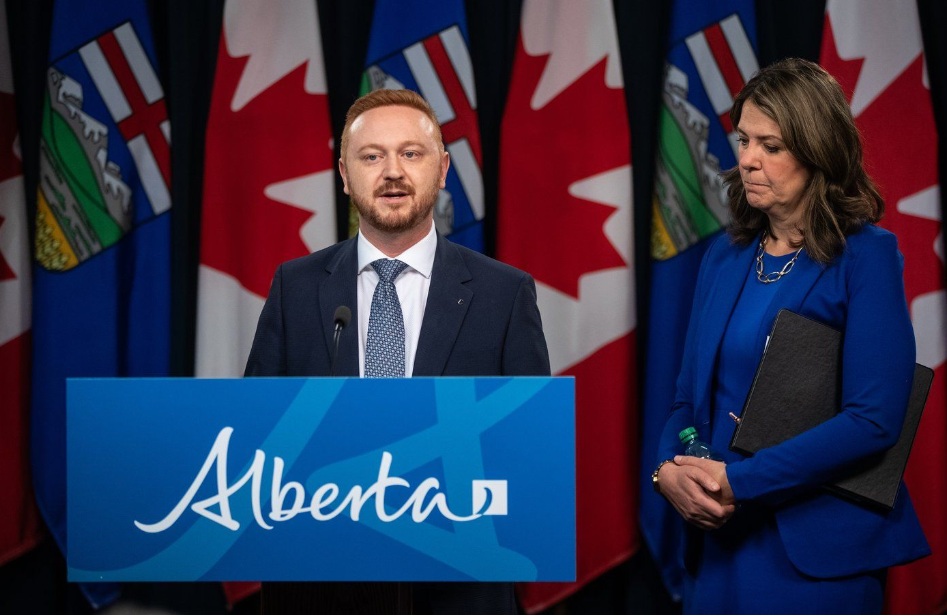Alberta's chief electoral officer is rebuffing calls from Premier Danielle Smith and her justice minister to reverse course and sign off on a proposed referendum question on separation.
On social media, Smith and Justice Minister Mickey Amery said earlier Tuesday that Albertans should be able to embark on gathering signatures "without needless bureaucratic red tape or court applications slowing the process."
Their remarks came after chief electoral officer Gordon McClure announced he had referred the proposed referendum question on separation to the courts so a judge could decide if it contravenes Canada's Constitution.
McClure, in a statement Tuesday, responded by saying he's merely following procedure and that the gravity of such a potential referendum invites judicial oversight and close inspection.
"In seeking the opinion of the Court, the Chief Electoral Officer is fulfilling his duty under the Citizen Initiative Act in an independent, neutral and non-partisan manner," he said.
The proposed question — which needs McClure's approval before the group behind it can start gathering the signatures necessary to get it on a ballot — seeks a yes or no answer to: "Do you agree that the Province of Alberta shall become a sovereign country and cease to be a province in Canada?"
Amery says in his post that since the province would ultimately be responsible for implementing any referendum result, the electoral officer's request for judicial scrutiny is premature.
"We encourage Elections Alberta to withdraw its court reference and permit Albertans their democratic right to participate in the citizen initiative process," he wrote.
Smith's post said she agrees with Amery, but adds she believes in "Alberta sovereignty within a united Canada."
McClure, in his statement, said the question is "serious and significant," and that it has "the potential to have profound impact on all Albertans."
He also clarified that he's specifically looking for a judge to rule if the proposed question contravenes specific sections of the Constitution, including the rights set out in the Charter, the enforcement of those rights, and treaty rights.
Smith and Amery's comments came after the group that submitted the question called the electoral officer's Monday decision a "delay tactic."
Opposition NDP deputy leader Rakhi Pancholi, in a statement, accused Smith and Amery of going against the administration of a law they themselves set in order to appease separatists within the United Conservative Party.
“Yet again, Danielle Smith and her UCP government’s authoritarian tendencies, corruption and incompetence are on full display," Pancholi said.
“Albertans deserve better than a government hell-bent on tearing our country apart to save their political skins.”
Mitch Sylvestre with the Alberta Prosperity Project, whose name is attached to the application submitted to the electoral officer, has not responded to interview requests this week.
Sylvestre has said he thinks interest among Albertans in holding a separation referendum increases with every speaking event his group organizes.
"The more people that hear what the message is, the more people that will be in favour," he said in an interview last month.
Provincial law says a hearing date must be scheduled within 10 days of the court referral, and McClure's office says he would have 30 days after a court ruling is issued to determine if the proposed referendum question meets other legislated requirements.
If approved, Sylvestre and the Alberta Prosperity Project would need to collect 177,000 signatures in four months to put the question of Alberta separation on a ballot.
In June, the chief electoral officer approved a competing question that seeks to have Alberta make it official policy that the province will never separate from Canada.
That petition, put forward by former Alberta Progressive Conservative deputy premier Thomas Lukaszuk, was approved before new provincial rules took effect that lowered the threshold for citizen-initiated referendums to get on ballots.
Amery said Tuesday the rule changes were intended to make the process "broadly permissive" and that McClure's referral to the court didn't match the intent behind the changes.
This report by The Canadian Press was first published July 29, 2025
